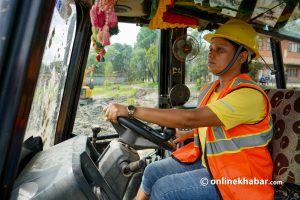
Initiatives aimed at inclusivity and empowerment often stem from acknowledging long-standing issues that have been conveniently swept under the rug. Take, for instance, the glaring problem of authenticating signatures for individuals with visual impairments.
This obstacle not only strips away their autonomy but also shackles them to a perpetual cycle of dependence. Yet, amidst this bleak scenario, Prayatna Nepal emerged with a glimmer of hope in the form of its signature training programme.
Launched in 2017, this initiative, spearheaded by Sundip Gyawali in partnership with the organisation, stands as a bold attempt to break free from the chains of fingerprint reliance.
The significance of signature training
Signature training, an often overlooked facet in the field of accessibility, holds undeniable importance, particularly when addressing the formidable challenges faced by visually impaired individuals attempting to navigate and reproduce signatures.
The hurdles they confront go beyond mere inconvenience, emerging as substantial barriers that impede their autonomy across pivotal domains such as education, finance, and parenting. The ramifications of this struggle are not confined solely to general visually impaired individuals; even educators with vision impairment, armed with academic qualifications, find themselves ensnared in a web of marginalisation due to the difficulties they encounter in signing documents.
This predicament not only hampers their professional advancement but also inflicts damage on their self-esteem. The urgency of finding effective solutions in this often neglected facet of accessibility is glaring, as it directly impacts the lives and opportunities of those grappling with the challenges of signature replication.
Furthermore, the issue goes beyond education, plaguing visually impaired parents with comparable obstacles when it comes to navigating bureaucratic red tape concerning their children’s schooling and welfare.
The struggle does not stop there; mundane tasks like attending events or conducting banking affairs turn into veritable minefields due to the inability to wield a traditional signature. This lack of a functional autograph not only erects barriers but also subjects individuals to feelings of ostracisation and degradation.
Gandaki province-specific training

The prerequisite to cater to the distinct demands of teachers, particularly those with visual impairments, in the task of independently signing documents was acknowledged as a challenge.
In response, Prayatna Nepal organised specialised signature training sessions tailored specifically for educators in Gandaki province. These sessions were designed to address the unique needs of the province’s teachers, ensuring that they could confidently carry out their daily responsibilities without dependency.
Through strategic alignment with their typical work routines, the objective of Prayatna Nepal was to not only impart necessary skills but also to ensure self-assurance and autonomy among the teaching community.
The technique
Signature training employs a unique technique where participants practice writing alphabets using slates and styluses on braille paper.
Initially, the focus is on mastering alphabet formulas, progressing to writing them with a pen on a slate board. Once proficiency in writing their names independently is achieved, participants are encouraged to create personalised signatures on plain paper, tapping into their creativity.
Understanding the signature guide
A vital tool in this training is the signature guide, a wooden square providing a small writing space that allows participants to write in a straight line without relying on a slate board. This innovation empowers visually impaired individuals by offering them a tangible guide to develop and refine their signatures independently.
In conclusion, the strides made by initiatives like Prayatna Nepal’s signature training programme underscore a crucial shift towards inclusivity and empowerment for visually impaired individuals, particularly educators. By addressing the often overlooked challenge of signature replication, these initiatives dismantle barriers to autonomy and pave the way for greater participation in essential aspects of life such as education, finance, and parenting.
The specialised training sessions tailored to the unique needs of educators in Gandaki Province exemplify a targeted approach that not only imparts necessary skills but also strengthens self-assurance and independence. Embracing innovative techniques and tools like the signature guide not only enables individuals to operate bureaucratic complexities with confidence but also affirms their dignity and worth. Moving forward, such efforts must continue to be championed, ensuring that no individual is left behind in the pursuit of a truly inclusive society.
It is high time to realise and inculcate the practical essence of inclusion guided by the principles of equity and empathy when striving to empower visually impaired educators and individuals alike to realise their full potential and contribute meaningfully to the collective effort towards progress and inclusivity.























